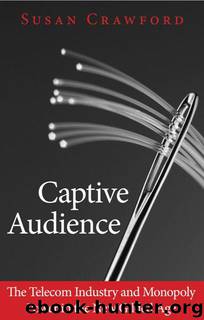Captive Audience: The Telecom Industry and Monopoly Power in the New Gilded Age by Crawford Susan P

Author:Crawford, Susan P. [Crawford, Susan P.]
Language: eng
Format: epub
Tags: Non-Fiction, Politics
ISBN: 9780300153132
Google: j1qWmAEACAAJ
Amazon: 0300153139
Barnesnoble: 0300153139
Goodreads: 13593973
Publisher: Yale University Press
Published: 2012-12-03T07:00:00+00:00
But even Cohen wasn't ready for what came next.
That February, during a House Judiciary Committee hearing held the same day as the Senate Antitrust Subcommittee meeting, African American members of Congress complained that NBC programming was not sufficiently diverse; the network had not a single African American–targeted show. When Rep. Maxine Waters (D-Calif.) asked NBC Universal president Jeff Zucker why this was, he replied, “we have not found that [African American] show.” When Waters continued pressing, Zucker assured her that NBC was continuing to look for a good African American program. “Let me say that it is very difficult to accept that you cannot find the kind of program I'm talking about,” Waters said. “It is unacceptable to say you don't know … when it could happen. … I don't think black viewers would like to hear that kind of answer.” The same went for the news: Rep. Sheila Jackson Lee (D-Tex.) noted that there is no diversity on the Sunday morning talk shows, including NBC's Meet the Press. Waters and Jackson Lee also asked Brian Roberts why Comcast had just one woman and one African American man on its board; Rep. Luis Gutierrez (D-Ill.) noted that the board had no Hispanics. Roberts was forced to admit that he didn't have a good answer.34
A few months later, things heated up considerably: Waters and sixty-eight other members of Congress, many of them members of the Congressional Black Caucus or the Congressional Hispanic Conference, asked the FCC to extend its public comment period and hold public hearings on the merger.35
Hiring policies, board membership, and programming diversity had no relevance to the competition and concentration issues raised by the merger, but these comments hurt Comcast's public image and were important to the larger public-interest concerns at the FCC. Comcast needed to avoid the kind of interest-group politics that could destroy reputations and scuttle carefully laid plans; indeed, it had attempted to forestall objections through the public-interest commitments in its original filing. Apparently those were not enough.
After the FCC declined to hold the hearing Waters wanted, John Conyers (D-Mich.), chairman of the House Judiciary Committee, arranged for a field hearing in Los Angeles in June. It was Waters's hearing; it was well-attended, raucous at times, frequently interrupted by applause, and nearly four hours long. Taking NBC to task for not having adequate diversity among its executives, Waters said, “If you're telling me how many janitors you're hiring, how many clerks you're hiring—that's not good enough. We know we can always get some numbers at that lower level. So having said that, let's just understand each other. This is about ownership, this is about programming, this is about executive management, this is about advertising.”36 Roberts and Zucker were conspicuously absent, but less senior Comcast executives listened politely. (John D. Rockefeller also made it a practice not to show up at hearings that promised to be unpleasant.)
During that same hearing, Stanley Washington (representing a new group called the National Coalition of African American Owned Media, which
Download
This site does not store any files on its server. We only index and link to content provided by other sites. Please contact the content providers to delete copyright contents if any and email us, we'll remove relevant links or contents immediately.
Nudge - Improving Decisions about Health, Wealth, and Happiness by Thaler Sunstein(6633)
Deep Work by Cal Newport(5464)
Principles: Life and Work by Ray Dalio(5322)
The Doodle Revolution by Sunni Brown(4043)
Factfulness: Ten Reasons We're Wrong About the World – and Why Things Are Better Than You Think by Hans Rosling(4021)
Thinking in Bets by Annie Duke(3531)
Eat That Frog! by Brian Tracy(3514)
Writing Your Dissertation in Fifteen Minutes a Day by Joan Bolker(3299)
Visual Intelligence by Amy E. Herman(3281)
Hyperfocus by Chris Bailey(3270)
How to win friends and influence people by Dale Carnegie(2826)
How to Win Friends and Influence People in the Digital Age by Dale Carnegie & Associates(2822)
Schaum's Quick Guide to Writing Great Short Stories by Margaret Lucke(2804)
Hidden Persuasion: 33 psychological influence techniques in advertising by Marc Andrews & Matthijs van Leeuwen & Rick van Baaren(2778)
The Pixar Touch by David A. Price(2740)
Ogilvy on Advertising by David Ogilvy(2682)
The Slow Fix: Solve Problems, Work Smarter, and Live Better In a World Addicted to Speed by Carl Honore(2574)
Work Clean by Dan Charnas(2562)
The Content Trap by Bharat Anand(2493)
